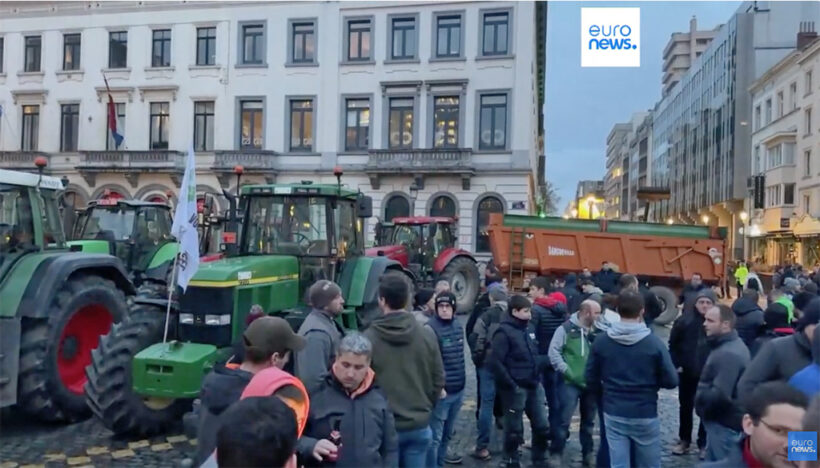Emmanuel Macron’s government has been forced to announce new measures in an attempt to defuse protests in the agricultural sector. The pulse of the sector points to the free trade agreement with Mercosur.
The agricultural sector is in turmoil in the European Union as a whole. Except in Spain, where there have not yet been any major protests, farm workers throughout the EU, with particular emphasis on France, but also in Germany and Poland, where mobilization has begun, are protesting against a series of measures taken separately in the different states.
They all point to poor working conditions in agriculture, increases in energy and input prices, and the collapse in the real prices paid to producers. Last week, Facua denounced that, in the case of Spain, food prices rise by up to 875% from the farm to the supermarket.
Despite this, Spain is one of the five countries where prices received by producers have risen compared to 2022 – even more marked by the energy crisis than in 2023. The +5.4% in Spain contrasts with falls of more than 20% in Eastern countries such as Bulgaria, Hungary and Lithuania, 12.2% in Germany and 6.8% in France.
France, in the lead
As usual, French farmers are the ones who have managed to take their demands the furthest. In the case of this sector, the preoccupation comes from the new environmental regulations and the conditions of the free trade agreement with Mercosur (Uruguay, Argentina, Paraguay, and Brazil).
Emmanuel Macron has arrived at the important European Council summit being held today, 1 February, in Brussels, with a series of measures imposed by the struggle of the “angry farmers”. They were announced on 30 January by the brand-new prime minister, Gabriel Attal, and did not convince the farm workers, who have maintained mobilizations that will be two weeks old this weekend. Attal is expected to announce measures again on 1 February to appease the farmers’ anger.
On the Alternatives Economiques website, Véronique Marchesseau, secretary general of the Confédération paysanne, an agricultural union that is a member of the international organization Via Campesina, criticized the short-termism of the measures announced by Attal: “These are only short-term announcements that can temporarily relieve farms in difficulties. But we were waiting for substantial announcements that would allow us to consider our agricultural activity in the long term. We have expectations on income, that our sales prices will include our production costs and our remuneration”, he defends. In addition, the Confédération paysanne advocates the cancellation of all trade agreements under negotiation, such as those with New Zealand and Kenya.
However, this is not the majority voice among French farmers. The Fédération nationale des syndicats d’exploitants agricoles, which represents just over half of all farms, defends a model of intensive farming and, in the last few hours, has sought to reduce the pressure on the government, especially after the incidents at the Parisian food market in Rungis, where 18 people were arrested for blocking traffic.
Rural Coordination, the second largest union in terms of membership, maintains a more combative profile and is behind the vast majority of the 100 blockades in France at the moment. As a suspicious feature, its compatibility with extreme right-wing ideology is highlighted, with which it is connected by identity values and skepticism towards climate change.
What has been achieved so far includes exemptions from taxation on fallow land; a modification of customs duties for Ukrainian production that was imposed as a relief measure for the government of Volodymir Zelensky, but which has caused unease among European producers; and, most importantly, the ‘blocking’ of the draft Mercosur agreement in its current state.
The European Commission has given signals that it is all set to sign Mercosur. But the Florentine game of back and forth between Ursula Von der Leyen and Macron was this morning partially interrupted by the arrival of hundreds of tractors in Brussels. A summit of EU-27 leaders is taking place today, which is supposed to put the finishing touches to a trade agreement that was expected to be signed in mid-February.
The problem, according to the agricultural sector, is that although France is blocking ratification, trade agreements can be temporarily set in motion, as in the case of the agreement with Canada (CETA), which is in force even though two sovereign states have not ratified it.
In Brussels, the morning of 1 February began with burning dung in front of the European Parliament and a parade of tractors and small bonfires. These were mostly tractor drivers from Belgium, where the sector is mobilized for similar causes and over-fuel taxes. Other farmers from France and Germany also joined in. All of them are looking at trade agreements and the impact they have on farms.










